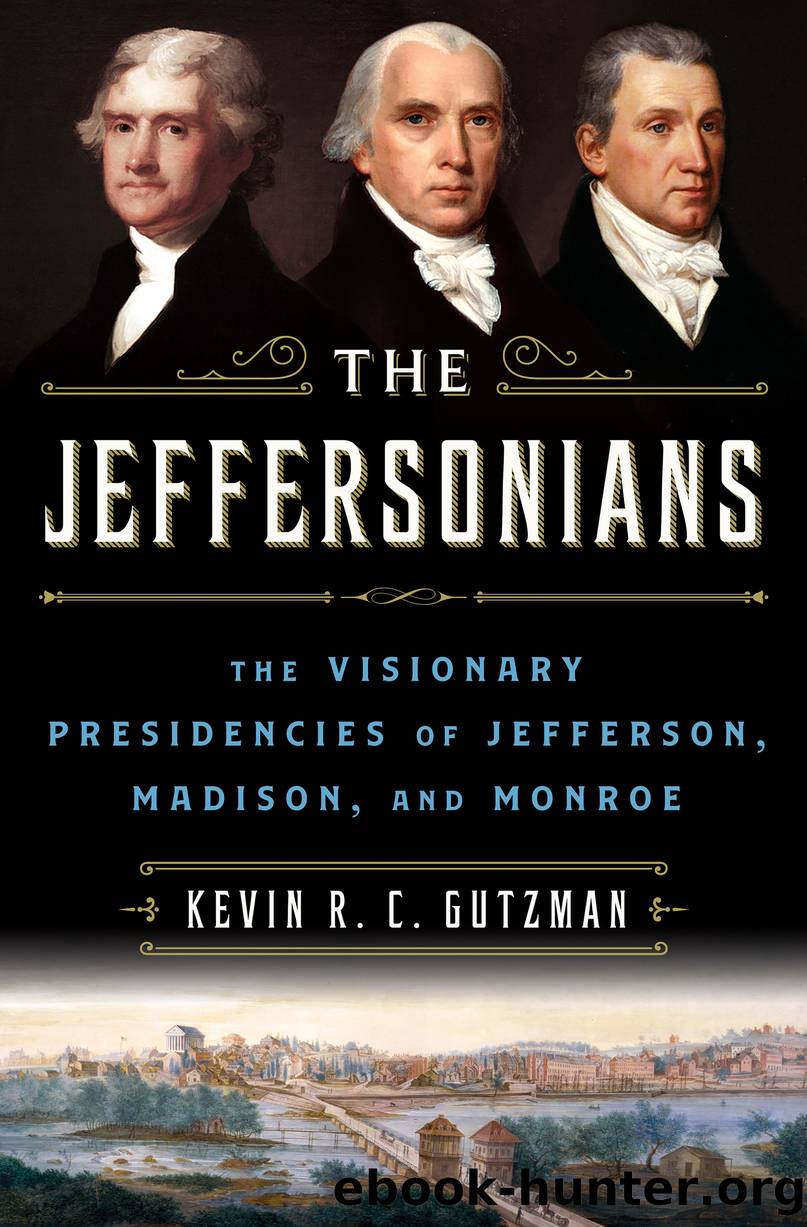The Jeffersonians by Kevin R. C. Gutzman

Author:Kevin R. C. Gutzman
Language: eng
Format: epub
Publisher: St. Martin's Publishing Group
42
Madisonâs Annual Message was delivered to Capitol Hill on December 7, 1813.1 He began by noting his disappointment that the British had rejected Alexanderâs offer of mediation. He asserted that this left America no alternative but to rely on her strength, which he illustrated by recounting a string of naval victories of which Perryâs was the most notable and important. It had led to the success in the Battle of the Thames, âwhich quickly terminated in the capture of the British and dispersion of the savage force.â Harrison, Johnson, and Governor Shelbyââwhose heroism, signalized in the war which established the Independence of his Country, sought at an advanced age, a share in hardships and battles, for maintaining its rights and its safetyââdrew particular praise. Progress on the banks of Lake Ontario, which like Lake Erie had come to be dominated by American arms, had been foiled in its beginnings by the weather, so that the planned campaign along the St. Lawrence had come to naught.
Madison lamented that the British, rather than emulating the Americans in not enlisting Indian nations into their forces, thus âmitigating [the warâs] calamities,â had instead employed them. âWherever they could be turned against us, no exertions to effect it, have been spared.â In the Southwest âa bloody fanaticism, recently propagated among themâ had made it ânecessary to crush such a war before it could spread among the contiguous tribes, and before it could favor enterprises of the Enemy into that vicinity.â He then made reference to the American victories at Tallushatchee and Talladega only a few weeks earlier, where as many as five hundred Creek warriors met their ends. Here for the first time the name of Major General Andrew Jackson, âan Officer equally distinguished for his patriotism and his military talents,â came to national attention.2 Madison lamented that the British perseverance in recruiting Indian allies into their service had at last âforced upon usâ a âdeparture from our protracted forbearance to accept the services tendered by them.â Even in accepting groups of Indians into their ranks, he insisted, the Americans had not followed âthe example of the enemy, who owe the advantages they have occasionally gained in battle, chiefly to the number of their savage associates; and who have not controuled them, either from their usual practice of indiscriminate massacre on defenseless inhabitants, or from scenes of carnage without a parallel, on prisoners to the British arms, guarded by all the laws ⦠of honorable war.â
Ruminating on this subject naturally led Madison into a lengthy passage on British treatment of American immigrants from Britain taken prisoner during the war. As they had been sent to Britain âfor trial as criminals,â âa like number of British prisoners of war were put into confinement, with a notification that they would experience whatever violence might be committed on the American prisoners of war, sent to Great Britain.â When the British responded to this by putting twice as many Americans under close confinement and warning of the destruction they would mete out on American coastal towns in case the U.
Download
This site does not store any files on its server. We only index and link to content provided by other sites. Please contact the content providers to delete copyright contents if any and email us, we'll remove relevant links or contents immediately.
The Radium Girls by Kate Moore(12028)
100 Deadly Skills by Clint Emerson(4925)
Rise and Kill First by Ronen Bergman(4789)
The Templars by Dan Jones(4689)
The Doomsday Machine by Daniel Ellsberg(4490)
The Rape of Nanking by Iris Chang(4213)
Killing England by Bill O'Reilly(4001)
Stalin by Stephen Kotkin(3965)
Hitler in Los Angeles by Steven J. Ross(3946)
12 Strong by Doug Stanton(3550)
Hitler's Monsters by Eric Kurlander(3343)
Blood and Sand by Alex Von Tunzelmann(3205)
The Code Book by Simon Singh(3189)
Darkest Hour by Anthony McCarten(3133)
The Art of War Visualized by Jessica Hagy(3007)
Hitler's Flying Saucers: A Guide to German Flying Discs of the Second World War by Stevens Henry(2754)
Babylon's Ark by Lawrence Anthony(2679)
The Second World Wars by Victor Davis Hanson(2524)
Tobruk by Peter Fitzsimons(2518)
